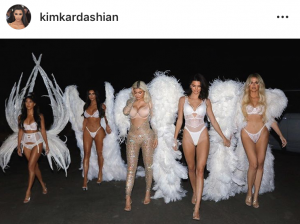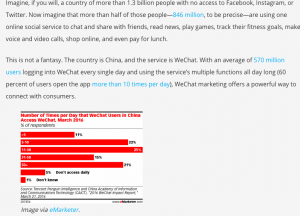If you haven’t heard of Kim Kardashian, you’ve probably been living under a rock for the last 11 years. You read that right: 11 years. It’s been over a decade since her fateful sex tape with then-boyfriend Ray J was leaked onto the internet. Since then, there has been much debate over whether she is a beautiful woman comfortable in her own skin and sexuality, or if she is indecent and a terrible role model. Regardless of your stance on that, there’s no denying her fame and influence. What really interests me about Kim K’s social media presence isn’t even Kim herself – it’s her followers.
On October 31st, 2018, Kardashian posted a picture on Instagram with her four sisters, Khloe, Kourtney, Kylie, and Kendall, all wearing lingerie and authentic Victoria’s Secret Angel wings.

Pretty great photo, right? Five women comfortable in their sexuality, going out as sisters. I was feeling empowered and good about the world – until I read the comment section. Mingled among the very positive comments from awed fans were several hateful and judgemental comments. One user wrote, “I look forward to the day that you will be without butt implants”, clearly referencing the various amounts of surgical enhancements the sisters have had done. Another quipped, “Can we just take a minute and realize there is no way in hell any of them would actually be in a Victoria secret show if they [weren’t] popular”. Some trolls also attacked Kim and her sisters for the revealing nature of the photo. Kim herself has been criticized for posting revealing photos while being a mother.


Kim Kardashian, as I mentioned before, is well known for posting sensational (and often revealing) photos. This kind of celebrity, who prompts both very positive and very negative responses, is always at risk from critics. By giving critics online access to celebrities, social media has magnified this risk. Not many people would go up to the Kardashians and tell them, “Talk about blown up egos. Kendall is the only one who should be in this picture,” but one person had no qualms about leaving this exact sentence in Kim’s comment section.
The problem is, social media has a dehumanizing effect. You wouldn’t go up to a stranger and offer them your negative opinion on their weight or outfit; there is a certain level of basic respect that most people try to give to other humans. That doesn’t stop us from having opinions and biases about other people that we disagree with. It simply stops us from acting on these negative opinions. But through a screen, and across a country, connected by wires and wireless, strangers seem less human. This respect isn’t a requirement anymore. And, because you can hide behind anonymity, there are minimal consequences.
The idea of “trolling” isn’t new. The word itself is associated with the internet and social media, but social media hasn’t created a new type of person; it has simply given unsavoury people a way to communicate their opinions without the risk of being immediately punched in the face.




